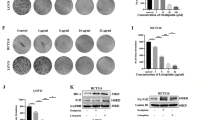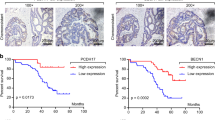Abstract
Although PYCR1 is a well-recognized oncogenic gene for malignant tumors, the causal relationship of its expression with malignant growth and cytotoxic chemotherapeutics remains unclear. Therefore, this study aimed to clarify the role of PYCR1 and its interaction with SLC25A10 in a chemotherapeutic agent 5-fluorouracil (5-FU)’s toxicity to colorectal cancer cells. PYCR1 and SLC25A10 expressions were detected in The Cancer Genome Atlas database and colon adenocarcinoma (COAD) clinical samples. PYCR1 upregulation was associated with SLC25A10 expression and poor prognosis, and its high expression indicated decreased survival rates in patients with COAD. PYCR1 overexpression inhibited lipid reactive oxygen species production and promoted SLC25A10 expression in colorectal cancer cells. PYCR1 silencing enhanced the antitumor effects of 5-FU. Ferroptosis inhibitor deferoxamine suppressed the antitumor effects of PYCR1 silencing, whereas ferroptosis inducer erastin inhibited the protumor effects of PYCR1 overexpression. SLC25A10 overexpression reversed the antitumor effects of PYCR1 silencing in vitro and inhibited the antitumor effects of erastin in vivo. Therefore, PYCR1 is an oncogenic gene that promotes colorectal tumor growth and desensitizes colorectal cancer cells to 5-FU cytotoxicity by preventing apoptosis and ferroptosis.







Similar content being viewed by others
References
Hu T, Li Z, Gao CY, Cho CH. Mechanisms of drug resistance in colon cancer and its therapeutic strategies. World J Gastroenterol. 2016;22(30):6876–89.
Cao Y. Adipocyte and lipid metabolism in cancer drug resistance. J Clin Invest. 2019;129(8):3006–17.
Asano T. Drug resistance in cancer therapy and the role of epigenetics. J Nippon Med Sch. 2020;87(5):244–51.
Iorio F, Knijnenburg TA, Vis DJ, et al. A landscape of pharmacogenomic interactions in cancer. Cell. 2016;166(3):740–54.
D’Aniello C, Patriarca EJ, Phang JM, Minchiotti G. Proline metabolism in tumor growth and metastatic progression. Front Oncol. 2020;10:776.
Bogner AN, Stiers KM, Tanner JJ. Structure, biochemistry, and gene expression patterns of the proline biosynthetic enzyme pyrroline-5-carboxylate reductase (PYCR), an emerging cancer therapy target. Amino Acids. 2021;53(12):1817–34.
Yan K, Xu X, Wu T, et al. Knockdown of PYCR1 inhibits proliferation, drug resistance and EMT in colorectal cancer cells by regulating STAT3-Mediated p38 MAPK and NF-kappaB signalling pathway. Biochem Biophys Res Commun. 2019;520(2):486–91.
Zeng T, Zhu L, Liao M, et al. Knockdown of PYCR1 inhibits cell proliferation and colony formation via cell cycle arrest and apoptosis in prostate cancer. Med Oncol. 2017;34(2):27.
Cheng C, Song D, Wu Y, Liu B. RAC3 promotes proliferation, migration and invasion via PYCR1/JAK/STAT signaling in bladder cancer. Front Mol Biosci. 2020;7:218.
Zhuang J, Song Y, Ye Y, et al. PYCR1 interference inhibits cell growth and survival via c-Jun N-terminal kinase/insulin receptor substrate 1 (JNK/IRS1) pathway in hepatocellular cancer. J Transl Med. 2019;17(1):343.
Roth U, Razawi H, Hommer J, et al. Differential expression proteomics of human colorectal cancer based on a syngeneic cellular model for the progression of adenoma to carcinoma. Proteomics. 2010;10(2):194–202.
Alaqbi SS, Burke L, Guterman I, et al. Increased mitochondrial proline metabolism sustains proliferation and survival of colorectal cancer cells. PLoS ONE. 2022;17(2): e0262364.
Cai T, Hua B, Luo D, et al. The circadian protein CLOCK regulates cell metabolism via the mitochondrial carrier SLC25A10. Biochim Biophys Acta Mol Cell Res. 2019;1866(8):1310–21.
Zhou X, Paredes JA, Krishnan S, Curbo S, Karlsson A. The mitochondrial carrier SLC25A10 regulates cancer cell growth. Oncotarget. 2015;6(11):9271–83.
Hlouschek J, Ritter V, Wirsdorfer F, Klein D, Jendrossek V, Matschke J. Targeting SLC25A10 alleviates improved antioxidant capacity and associated radioresistance of cancer cells induced by chronic-cycling hypoxia. Cancer Lett. 2018;439:24–38.
Lin Y, Berg AH, Iyengar P, et al. The hyperglycemia-induced inflammatory response in adipocytes: the role of reactive oxygen species. J Biol Chem. 2005;280(6):4617–26.
Motamedian E, Ghavami G, Sardari S. Investigation on metabolism of cisplatin resistant ovarian cancer using a genome scale metabolic model and microarray data. Iran J Basic Med Sci. 2015;18(3):267–76.
Obeng E. Apoptosis (programmed cell death) and its signals—a review. Braz J Biol. 2021;81(4):1133–43.
Mou Y, Wang J, Wu J, et al. Ferroptosis, a new form of cell death: opportunities and challenges in cancer. J Hematol Oncol. 2019;12(1):34.
Ding Y, Chen X, Liu C, et al. Identification of a small molecule as inducer of ferroptosis and apoptosis through ubiquitination of GPX4 in triple negative breast cancer cells. J Hematol Oncol. 2021;14(1):19.
Yao X, Li W, Fang D, et al. Emerging roles of energy metabolism in ferroptosis regulation of tumor cells. Adv Sci (Wein). 2021;8(22): e2100997.
Pan G, Zhang K, Geng S, et al. PHF14 knockdown causes apoptosis by inducing DNA damage and impairing the activity of the damage response complex in colorectal cancer. Cancer Lett. 2022;531:109–23.
Chandrashekar DS, Karthikeyan SK, Korla PK, et al. UALCAN: an update to the integrated cancer data analysis platform. Neoplasia. 2022;25:18–27.
Zhao L, Zhou X, Xie F, et al. Ferroptosis in cancer and cancer immunotherapy. Cancer Commun (Lond). 2022;42(2):88–116.
Choi BH, Coloff JL. The diverse functions of non-essential amino acids in cancer. Cancers (Basel). 2019;11(5):675.
Montrose DC, Saha S, Foronda M, et al. Exogenous and endogenous sources of serine contribute to colon cancer metabolism, growth, and resistance to 5-fluorouracil. Cancer Res. 2021;81(9):2275–88.
Geng P, Qin W, Xu G. Proline metabolism in cancer. Amino Acids. 2021;53(12):1769–77.
Phang JM. Proline metabolism in cell regulation and cancer biology: recent advances and hypotheses. Antioxid Redox Signal. 2019;30(4):635–49.
Xiao S, Li S, Yuan Z, Zhou L. Pyrroline-5-carboxylate reductase 1 (PYCR1) upregulation contributes to gastric cancer progression and indicates poor survival outcome. Ann Transl Med. 2020;8(15):937.
Ding Z, Ericksen RE, Escande-Beillard N, et al. Metabolic pathway analyses identify proline biosynthesis pathway as a promoter of liver tumorigenesis. J Hepatol. 2020;72(4):725–35.
Blondy S, David V, Verdier M, Mathonnet M, Perraud A, Christou N. 5-Fluorouracil resistance mechanisms in colorectal cancer: from classical pathways to promising processes. Cancer Sci. 2020;111(9):3142–54.
He Z, Yang J, Sui C, et al. FAM98A promotes resistance to 5-fluorouracil in colorectal cancer by suppressing ferroptosis. Arch Biochem Biophys. 2022;722: 109216.
Yao W, Wang J, Meng F, et al. Circular RNA CircPVT1 inhibits 5-fluorouracil chemosensitivity by regulating ferroptosis through MiR-30a-5p/FZD3 axis in esophageal cancer cells. Front Oncol. 2021;11: 780938.
Chaudhary N, Choudhary BS, Shah SG, et al. Lipocalin 2 expression promotes tumor progression and therapy resistance by inhibiting ferroptosis in colorectal cancer. Int J Cancer. 2021;149(7):1495–511.
Du S, Sui Y, Ren W, Zhou J, Du C. PYCR1 promotes bladder cancer by affecting the Akt/Wnt/beta-catenin signaling. J Bioenerg Biomembr. 2021;53(2):247–58.
Funding
This study was supported by Science and Technology Development Fund Of Shanghai Pudong New Area (PKJ2020-Y15), The leading talent Training Program of Pudong Health Bureau of Shanghai (PWRl2019-03), Excellent subject leader training project of the three-year action plan of Shanghai public health system (GWV-10.2-XD15) and Key discipline construction project of the three-year action plan of Shanghai public health system (GWV-10.1-XK9).
Author information
Authors and Affiliations
Contributions
Conceptualization: WX, XQ; methodology: BZ, ZM, XY; formal analysis and investigation: BZ, ZM, YY, YS, MZ; writing—original draft preparation: BZ, ZM; writing—review and editing: WX, XQ, YY; supervision: WX, XQ.
Corresponding authors
Ethics declarations
Conflict of interest
The authors have no relevant financial or non-financial interests to disclose.
Ethical approval
This study was performed in line with the principles of the Declaration of Helsinki. Approval was granted by the Institutional Ethical Review Committee of The Seventh People’s Hospital (Shanghai, China; approval number: 2022-7th-HIRB-025 for human subjects and 2022-011 for animal experiments).
Additional information
Publisher's Note
Springer Nature remains neutral with regard to jurisdictional claims in published maps and institutional affiliations.
Supplementary Information
Below is the link to the electronic supplementary material.
Rights and permissions
Springer Nature or its licensor holds exclusive rights to this article under a publishing agreement with the author(s) or other rightsholder(s); author self-archiving of the accepted manuscript version of this article is solely governed by the terms of such publishing agreement and applicable law.
About this article
Cite this article
Zhou, B., Mai, Z., Ye, Y. et al. The role of PYCR1 in inhibiting 5-fluorouracil-induced ferroptosis and apoptosis through SLC25A10 in colorectal cancer. Human Cell 35, 1900–1911 (2022). https://doi.org/10.1007/s13577-022-00775-5
Received:
Accepted:
Published:
Issue Date:
DOI: https://doi.org/10.1007/s13577-022-00775-5




